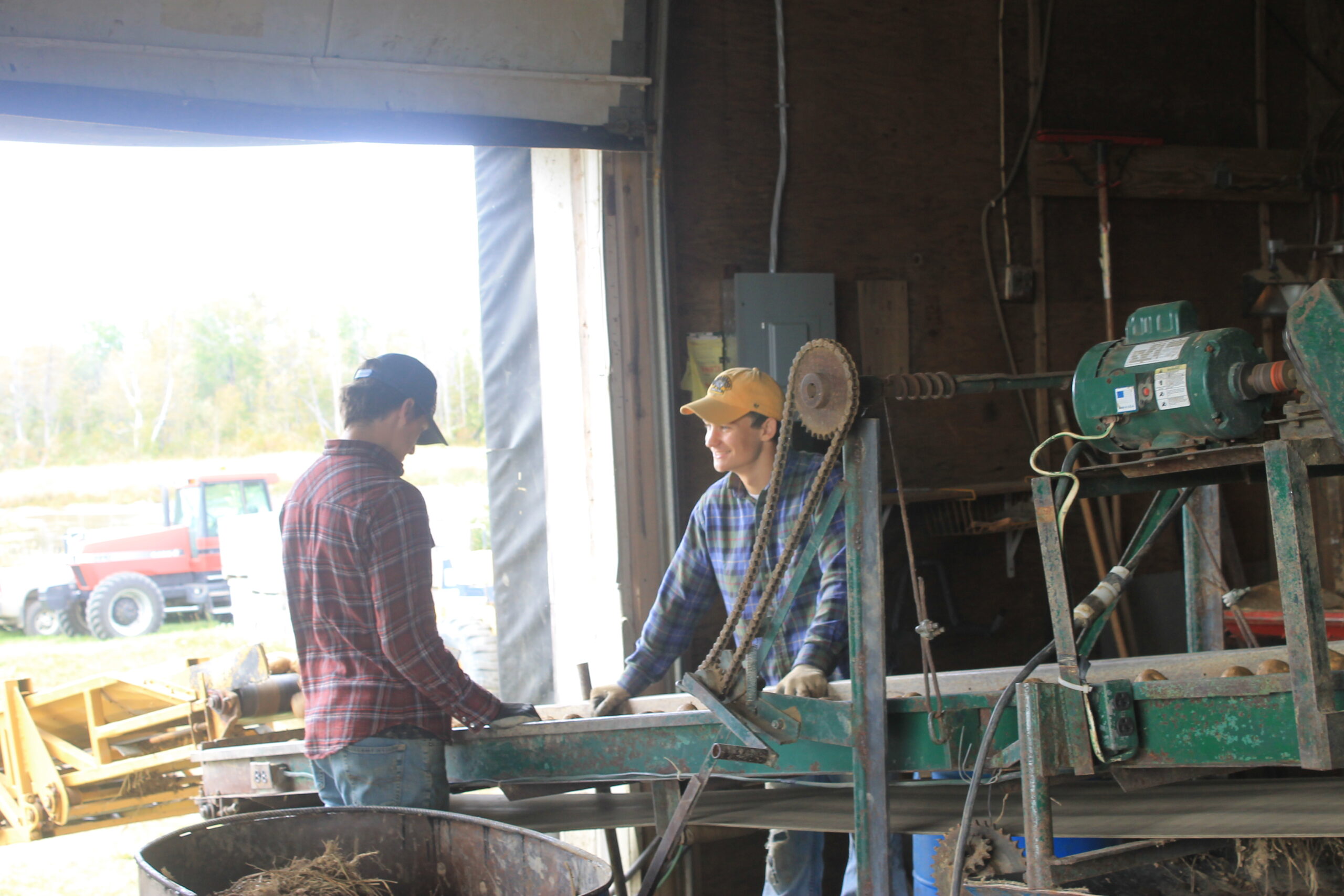
PRESQUE ISLE, Maine — With the harvest in full swing, Presque Isle potato farmer Shannon Staples said this year’s crop is so far looking “not bad.” More uncertain than this year’s crop, however, is the harvest workforce for years to come, as this is the last season that Presque Isle High School will break for three weeks
In February, the Maine School Administrative District 1 board of directors voted 9-7 in favor of ending the harvest break after this fall. Next year, students will only be able to take off from school and work the harvest for up to three weeks with permission from parents, a letter of support from a farmer, and an agreement that they will make up their school work. Starting in 2020, students who want to work harvest will be limited to two weeks.
“I don’t know what we’re going to do,” said Staples, whose family farms about 400 acres in the Presque Isle area. “We’ll find a way. We always have.”

Shannon Staples of Staples Farms operates a conveyor belt loading Lamoka seed potatoes into storage at a potato house in Caribou. Like other Presque Isle area farmers, Staples is not sure how his farm will deal with hiring harvest workers when Presque Isle High School’s harvest break is phased out after this year.
(Anthony Brino | BDN)
Like other Aroostook County potato farms, the Staples have long relied on local high schoolers to fill a temporary workforce need during the potato harvest. Even as potato production has evolved into a highly-mechanized operation, with only some small farms still hand picking their spuds, farms have continued to depend on high schoolers to work in the field and in storage facilities.
Students often work on harvest machines and along conveyor belts, pulling out potato vines and weeds, rocks or damaged tubers. Students with driver’s licenses sometimes are given the big responsibility of driving trucks from fields to storage houses.
Staples said he knows that his family won’t reduce the acreage they farm or consider hiring temporary migrant farmworkers. “That’s impossible. You’re talking three-to-four weeks.”
They may step up efforts to hire retirees and other part-time workers, as well as invest in labor-saving machinery, he said.
The harvest break is still taking place in school districts in Caribou, Easton, Fort Fairfield and Mars Hill, with Caribou’s being two weeks long.
About 15 percent of Presque Isle High School students work on area potato farms during the harvest, one reason cited by proponents of ending the break. In addition to the $70,000 in costs incurred by the school district, some people worried that many students were just spending the time off not doing anything constructive, losing out on educational time and potentially getting into trouble.
Bethany Staples, Shannon’s wife, said that as a teacher and member of a farm family,she understands the difficult issues involved in the decision over whether to end or continue the harvest break, although she had hoped there would be another outcome.
“I see both sides of it,” said Staples, who teaches special education at Presque Isle High School. “I understand it’s a dying tradition. I’m sad to see it go. It’s going to hurt us.”

Potatoes are unloaded off the trucks into storage at a Staples Farms storage facility in September 2018.
(Anthony Brino | BDN)
“We have excellent vocational programs. It’s sad that we can’t find some way to incorporate some of that into the harvest break. Not all kids are paper and pencil, textbook learners. Hands-on is very important.”
Staples grew up working during harvest breaks at area potato farms and at MSAD 1’s educational farm. As an adult, she’s helped organize student work crews for the harvest and in recent years has made efforts to be flexible with students’ schedules, particularly fall sports.
“We’ve had a variety of kids. We’ve had high honors students and top athletes, and they’ve been great and we’ve worked around their schedules. We’ve also had some kids where school is just not for them. They turn into great workers. They show us great work ethic and then they turn around to us and say, ‘Can we put you as a reference on a job application or is there anyway you can write me a college recommendation or a scholarship recommendation?’”
Staples’ step-son is currently a junior at Presque Isle High School, and as parents she and Shannon aren’t sure if they’ll want him missing classes next year.
“I think it’s going to be very difficult,” she said of the conditions under which students will be able to work harvest in the future.
“I see the workload these kids have. The kids’ parents aren’t going to want that to happen for their kids.”
Conner Demerchant, a 16-year-old junior at Presque Isle High School, is one of 11 Presque Isle High School students working at Staples Farms this year for $10 an hour. He’s worked there for two years, plays soccer, hockey and baseball, and is looking to study engineering in college.
“A lot of my friends work harvest break,” Demerchant said. “A lot of the players for the soccer team do.”
The team still plays some games during the harvest break, though, so the working players make arrangements..
“We work in the morning, take off for a couple hours before the game and then go to the game,” Demerchant said. “I think harvest is pretty important. Some kids really want to get out there.”
Demerchant said he doesn’t know if he’ll work the harvest next year, when he’d have to make up three weeks’ worth of homework after missing class.
“I might try that. I’m not sure yet.”







